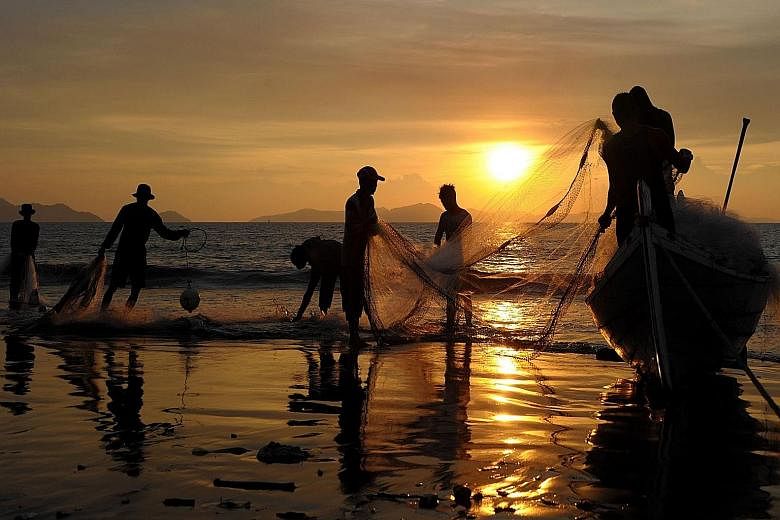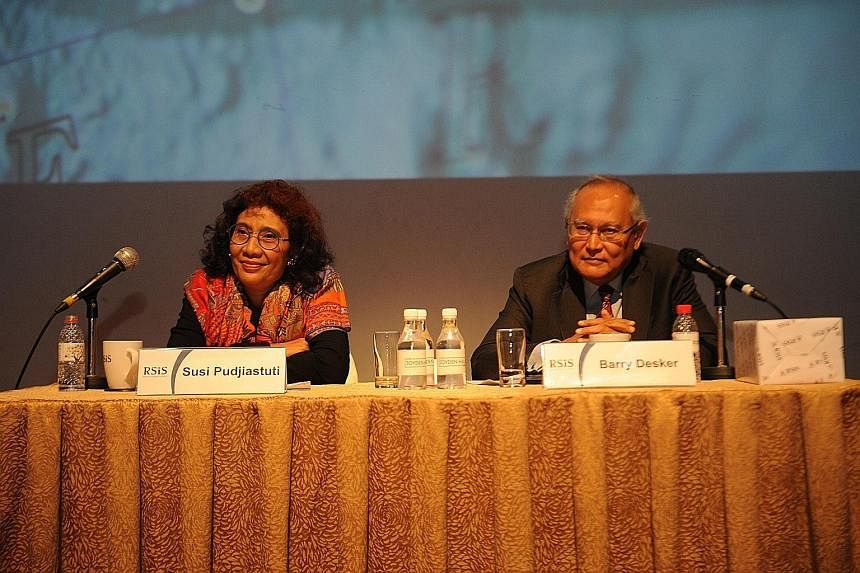Indonesia is building small runways near 15 fishing villages to help local fishermen export their catch while they are fresh and command a premium, said Maritime Affairs and Fisheries Minister Susi Pudjiastuti yesterday.
The entrepreneur-turned-politician said these 1km-long airstrips - or just long enough to land light aircraft - will connect fishermen from various parts of Indonesia to markets at home and abroad.
"We can send our fresh products immediately on the same day to Japan or Europe... by opening up direct flights from the eastern part of Indonesia," she said.
"The obstacle right now is that everything has to go through Jakarta which takes longer."
Ms Susi was in Singapore to deliver a public lecture, organised by the S. Rajaratnam School of International Studies, on Indonesia's maritime policy and its challenges.
She is also meeting businessmen here to discuss trade opportunities and hopes to see investors from Singapore involved in the project to build the 15 airstrips.
Opening up new gateways to global markets from each fishing sector of Indonesia will be an "incredible breakthrough", she said.
Airfreight capabilities will offer the opportunity for local fishermen to enter a high value market because consumers pay a premium for fresh seafood, she added.
In a public opinion survey carried out in mid-2015, the Indo Barometer Survey and Political Communication Institute ranked Ms Susi as the best-performing minister.
She also survived President Joko Widodo's recent Cabinet reshuffle that was prompted by Indonesia's flagging economic growth since he took office in 2014.
Her ministry is a key driver behind Mr Joko's plan to revive the shipbuilding and fisheries industries in a bid to re-establish Indonesia as a maritime power.
Latest figures showed that the fisheries sector in the country grew 8.6 per cent in the first quarter, outperforming the national growth rate of 4.7 per cent.
Ms Susi said the sector is set to achieve its target of 10 per cent for the year.
Noting the importance of the fisheries industry, Indonesia has been trying to maximise the potential of the sector through, among other things, modernisation of current industry practices, abolishing trans- shipment activities, and going after poachers. According to Mr Joko, Indonesia suffers annual losses of more than US$20 billion (S$28 billion) from illegal fishing.
Enforcement efforts have been ramped up, including the enhancement of its maritime surveillance capabilities. To send a strong signal to poachers, illegal fishing boats seized in Indonesia were duly sunk.
Statistics in handouts distributed to participants at yesterday's lecture showed that between 2007 and 2014, the Maritime Affairs and Fisheries Ministry sank 38 vessels for breaching fishing laws. Joint enforcement efforts with the Indonesian Navy and police, however, saw a total of 59 vessels sunk between last year and this year.
They do not include the 37 illegal fishing boats it put underwater on Aug 18. The original plan was to take down 70 illegal vessels to commemorate Indonesia's 70th Independence Day, which falls on Aug 17.
Its policy of sinking vessels seized from poachers has attracted some criticism.
Ms Susi defended the policy yesterday, saying that it has not only helped reduce intrusions but also curbed the illegal trade of highly subsidised fuel sold to poachers.
"The media has made (the sinking of illegal fishing vessels) more sensational, which is sometimes inappropriate but it is needed for a deterrent effect," she said.
"But it is good that that we didn't have that many poachers coming to our waters any more (and) it's a good sign that we could not sink 70 in August - only 37."



